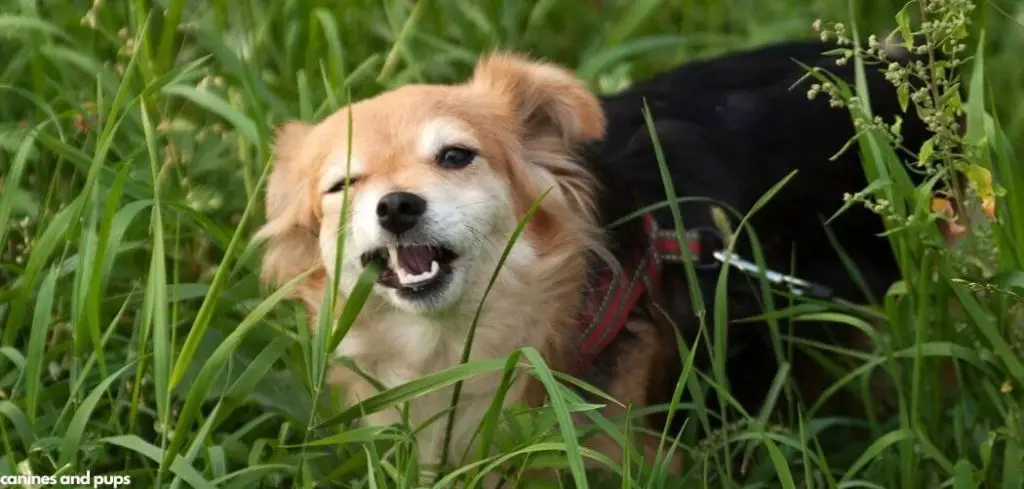It can be concerning to watch a dog constantly eat grass, especially if it seems to happen daily or more than just occasionally.
While it may look odd or even unhealthy, grass-eating is actually a fairly common behavior in dogs.
We outline the common reasons why a dog may constantly eat grass, what you can do, and when to seek veterinary help.
Dog Constantly Eats Grass — Why It Happens
A dog may constantly eat grass when they feel nauseous, have an upset stomach, are bored, anxious, or simply enjoy the taste and texture. Nutritional deficiencies, particularly in fiber, may also lead a dog to seek out grass.
In older dogs, excessive grass-eating could even signal an underlying health condition that requires veterinary attention.

Dog Constantly Eats Grass: Common Causes
Upset Stomach or Nausea
Many dogs turn to grass when they have digestive discomfort. The rough texture can stimulate vomiting, which may provide relief if the dog has ingested something that doesn’t agree with them.
Pet owners often notice their dog eating grass quickly and then vomiting soon afterward. This can be a sign the dog was trying to self-soothe.
While occasional vomiting may not be alarming, frequent episodes paired with constant grass-eating could point to a more serious gastrointestinal problem.
Read more: Dog suddenly excessively eating grass (What it reveals)
Nutritional Deficiencies
Dogs lacking certain nutrients, particularly fiber, may resort to eating grass as a supplement.
Fiber plays an important role in digestion, and when it’s missing from a dog’s diet, they might instinctively seek it out elsewhere.
This cause is especially likely in dogs on highly processed diets with limited whole food ingredients. Addressing dietary balance often reduces the urge to graze on grass excessively.
Boredom and Anxiety
Some dogs eat grass not because of physical discomfort but because of emotional distress. Boredom, separation anxiety, or stress may lead to repetitive behaviors, including chewing or swallowing grass.
In these cases, grass-eating is less about digestion and more about coping. Owners might notice the behavior occurring during times when the dog is left alone or not receiving enough physical and mental stimulation.
Enjoyment of Taste and Texture
For some dogs, eating grass is simply enjoyable. The texture, smell, and flavor may appeal to them in the same way some dogs love chewing on sticks or toys.
If the behavior doesn’t lead to vomiting or other health issues, this cause is generally harmless. However, it’s important to ensure the grass hasn’t been treated with pesticides or chemicals that could harm the dog.
Parasites or Gastrointestinal Disorders
Intestinal parasites and chronic digestive conditions, such as inflammatory bowel disease, can cause increased appetite for unusual substances, including grass.
Dogs may attempt to alleviate discomfort by consuming plants, though the underlying problem remains unresolved.
If a dog is eating grass constantly and showing additional symptoms such as diarrhea, weight loss, or lethargy, a veterinary exam is necessary to rule out parasites or more serious gastrointestinal illnesses.
Age-Related Health Conditions
Older dogs that suddenly start eating grass excessively may be showing signs of underlying disease.
Conditions affecting the liver, pancreas, or kidneys can alter digestion and appetite, causing dogs to develop unusual cravings.
In these cases, grass-eating is often just one of several symptoms. Owners should pay close attention to changes in drinking habits, energy levels, or appetite to help identify whether a deeper health concern is present.
What to Do If Your Dog Is Constantly Eating Grass
At home, the first step is to monitor the behavior carefully. Keep track of how often your dog eats grass, whether vomiting follows, and any other changes in appetite, stool, or energy.
Adjusting your dog’s diet can sometimes help. Adding more fiber-rich foods, fresh vegetables, or switching to a higher-quality balanced diet may reduce the urge. Ensuring your dog always has access to fresh water also supports digestive health.
Increasing mental and physical stimulation can help if boredom or anxiety is driving the behavior. Daily walks, interactive toys, and training sessions keep dogs engaged and less likely to resort to grass chewing.
Most importantly, make sure your dog only has access to untreated grass. Lawn chemicals, pesticides, and fertilizers can be toxic and turn a harmless habit into a dangerous one.
When to Call or Visit Your Vet
If your dog’s grass-eating is occasional and not paired with other symptoms, it may not be cause for concern. However, there are situations where veterinary care is necessary.
Call your vet if your dog is eating grass constantly and vomiting frequently, as this can signal gastrointestinal disease. Weight loss, diarrhea, lethargy, or changes in appetite are also warning signs that point to more serious conditions.
For older dogs, sudden new behaviors like excessive grass-eating should always be evaluated. Age-related diseases can progress quickly, and early diagnosis is key to effective treatment.
Lastly, seek urgent care if you suspect your dog ate grass treated with chemicals, as toxicity can cause immediate and severe health problems.
Read more: Dog Eating Grass Excessively (Here’s Why)
Key Takeaway
While it may seem strange, dogs eating grass is common and not always dangerous. The meaning behind the behavior varies — from boredom and dietary gaps to digestive upset and serious medical issues.
Pay attention to patterns, monitor for additional symptoms, and make adjustments to diet and lifestyle where possible. When in doubt, or if concerning signs appear, consulting a veterinarian is the safest way to ensure your dog’s well-being.
Caring attention and proactive monitoring can help determine whether constant grass-eating is just a quirky habit or a signal of something more serious.
